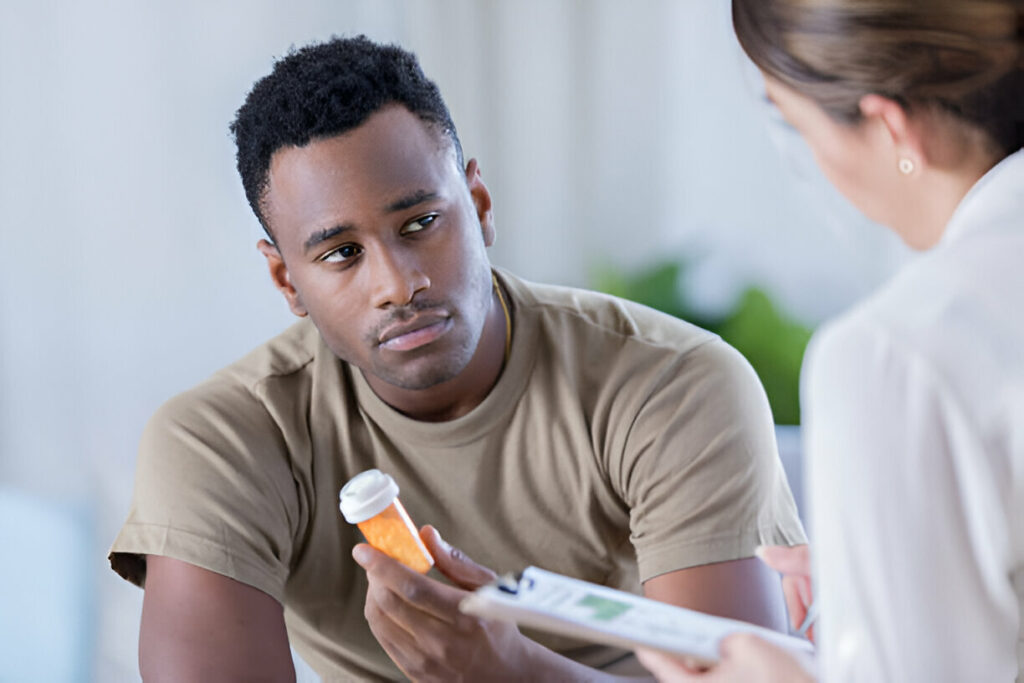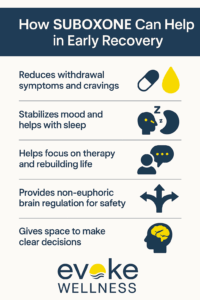There are days in early recovery that no one prepares you for. The days when the house is too quiet. When your phone doesn’t buzz. When you can’t stop thinking about how easy it would be to slip.
If you’re feeling that now—like recovery is just another kind of emptiness—I want you to know something: you’re not broken. And you’re not out of options.
I used to think being sober meant just white-knuckling it through those moments. But then I found out about Suboxone—and how a treatment program built around it could hold me up while I learned to stand on my own.
Here’s how Suboxone helped me stay in recovery long enough to actually feel alive again.
1. Suboxone doesn’t get you high—but it does help your brain stop screaming
When I first got clean, the cravings didn’t just go away. They came at me in waves. Middle of the night. Random Tuesdays. Any time I was alone.
Suboxone quieted that storm.
It binds to the same receptors that opioids do, but it doesn’t give you a high the way street drugs or full agonists do. Instead, it stabilizes your system. For me, that meant not waking up desperate for a fix. It gave me the chance to think clearly and make actual choices—not just react to the panic of withdrawal or craving.
That space—those few quiet breaths—were everything. It turned chaos into something I could actually manage.
2. It gives you a stable foundation to build a real life on
Loneliness in early sobriety is no joke. I felt like I had cut ties with everyone—and sometimes, I had. Old friends were using. Family didn’t know how to talk to me. I didn’t know how to talk to anyone.
Suboxone didn’t magically make me social. But it gave me just enough steadiness to start showing up. I could get to group. I could listen. I could stay in the room.
At Evoke Wellness Ohio, I found people who saw me—not just as someone with a past, but as someone with a future. And I was clear-headed enough, because of Suboxone, to believe them when they said I belonged.
Recovery isn’t just about not using. It’s about rebuilding connection—and Suboxone gave me enough calm to start trying again.
3. It helps your body and brain recover on their own timeline
One of the hardest parts of early sobriety is that the outside world expects you to bounce back fast. But your brain? It’s still healing. Your nervous system is still learning how to live without constant spikes and crashes.
Suboxone helps bridge that gap.
I started sleeping better. I could eat. My moods weren’t swinging out of control. That might not sound like a big deal—but when you’re trying to stay clean, those little wins add up fast.
Being physically stable made it easier to do the real emotional work. Therapy. Journaling. Showing up for myself. And on the days I couldn’t? Suboxone meant I didn’t spiral all the way down.
4. It’s not about being “on something”—it’s about staying alive and in the fight
I struggled with shame. I didn’t want to be someone who “needed a crutch.” I worried that being on Suboxone would mean I wasn’t really sober.
But here’s the truth I learned: recovery isn’t a competition. It’s survival. And the only goal in those early months is to stay here.
Suboxone helped me stay.
Over time, some people taper off. Others stay on longer. It’s not a one-size-fits-all thing. What matters is that you get a care plan that meets you where you actually are—not where someone else thinks you should be.
At Evoke Wellness Ohio, they treated me like a person—not a checklist. They helped me understand my options and find the pace that worked for me.
5. You’re not as alone as it feels right now
If you’re in Columbus and you’re wondering if there’s help for someone like you—there is.
Evoke Wellness Ohio runs a Suboxone treatment program that doesn’t just hand you a prescription and send you out the door. They walk with you. They talk with you. They let you be messy and unsure and tired. And they still show up.
That’s what saved me.
Recovery isn’t fast. It isn’t always pretty. But it is possible—especially when you’re supported by people who’ve seen the worst and still believe in the best.
“I didn’t think I deserved help. Suboxone gave me a second chance—one that stuck.”
– Outpatient Client, 2023
FAQs About Suboxone Treatment Programs
What exactly is Suboxone?
Suboxone is a combination of two medications—buprenorphine and naloxone. Buprenorphine helps reduce cravings and withdrawal symptoms, while naloxone helps prevent misuse. It’s often used as part of a Medication-Assisted Treatment (MAT) plan for opioid addiction.
Will I feel high on Suboxone?
No. Suboxone is designed to stabilize—not intoxicate. It binds to opioid receptors to ease withdrawal and cravings but without the euphoric effects of full opioids. That’s what makes it safer and more sustainable for long-term recovery.
Is Suboxone a long-term medication?
It can be, but it doesn’t have to be. Some people stay on it for months; others for years. Your treatment team will help you decide what’s right for you. The goal is to support your recovery—not rush you off something that’s helping.
Can I get Suboxone through Evoke Wellness Ohio?
Yes. Evoke Wellness Ohio offers a comprehensive Suboxone treatment program in Columbus that includes medication, therapy, and supportive care. They work with you to create a personalized recovery plan that respects your pace and your needs.
How do I get started?
You can call Evoke Wellness Ohio directly at (866) 430-9267 or visit our Suboxone treatment program page to learn more or schedule a confidential assessment.
Ready to Talk?
If you’re feeling shaky, alone, or unsure if you can keep going—reach out. A Suboxone treatment program might be the tool that helps you stay grounded long enough to build something better. You don’t have to figure it out alone.
Call (866) 430-9267 to talk with someone at Evoke Wellness Ohio who gets it—or start exploring what your options look like right here.



